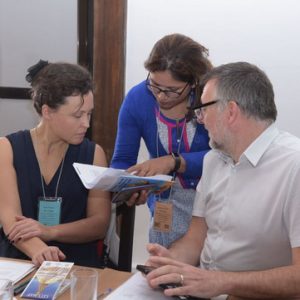Kathmandu SAMSN Resolution November 2019

Participants discussing the IFJ-FES Future Organising and Transforming Unions in South Asia Workshop Credit: Agni Niraula
South Asian IFJ affiliates – journalists’ unions and associations – meeting in Kathmandu, 6-8 November 2019 reaffirm their commitment to:
- Fight for media freedom, labour, professional, human rights and social justice
- Enhance the safety of journalists, especially for women journalists
- Build stronger unions and associations
- Campaign for a just transition for those moving from traditional to digital career paths
- Stand up for professionalism and ethical journalism
In particular we commit to:
Fight for media freedom
- Demand the end of internet shutdowns, website closures and actions which undermine the free flow of information
- Demand governments and employers abide by international labour rights and standards – and where they do not ask the IFJ to support affiliates to publicise and highlights such violations in appropriate national or international fora.
- Oppose laws which criminalise or undermine online journalism
Enhance the safety of journalists
- Improve the monitoring of violations of journalists rights
- Demand action to tackle impunity
- Campaign for employers to accept their responsibility for training, providing equipment and insurance for journalists, including freelance
- Highlight and seek to address the sexual harassment, violence and abuse – online and offline – faced by women journalists.
Build stronger unions and associations
- Prioritise recruitment among potential growth areas. To develop the research and mapping necessary to identify growth areas, particularly in digital media and among younger workers
- Identify the needs of digital and younger workers
- Review our internal and external communications to enhance our ability to deliver core strategic union messages
- To build links with universities and schools of journalism to raise awareness of unions, labour rights and professional ethics among students.
- To review our rules, structures and representativeness to enable digital, younger and freelance workers to join and play an active role and have a voice in our organisations.
- Recognising untapped potential and that union density remains too low – at 12% average across the region.
- Take active steps to enhance national collaboration and solidarity between journalist organisations on core common issues – especially labour issues.
- Extend and strengthen the digital media working group
Campaign for a just transition from offline to online media
- Oppose unwarranted job losses
- Demand fair compensation and full labour rights in the event of redundancies
- Demand employers/authorities provide funds for reskilling and retraining to enable those who lose their jobs to take up new employment opportunities
- Call on the IFJ to research and advocate for new sustainable financial/economic models for media
Protecting professionalism and ethical journalism
- Promote the IFJ’s global charter of ethics
- Develop a digital charter for media and social media
- Promote awareness of digital workers’ rights and responsibilities
- Develop strategies to counter mis/disinformation
- Promote broader media literacy programs and civil engagement
- Undertake awareness raising and training on ethical/professional issues
- To promote a journalism based on quality not clicks
Resources
- IFJ South Asia Media Bulletin, February 2023 02/15/2023 Download
- IFJ South Asia Media Bulletin, January 2023 01/18/2023 Download
- Nepal Press Freedom report 2022 01/03/2023 Download

